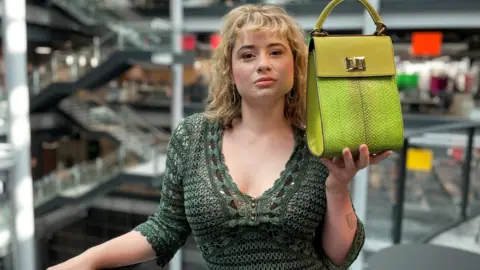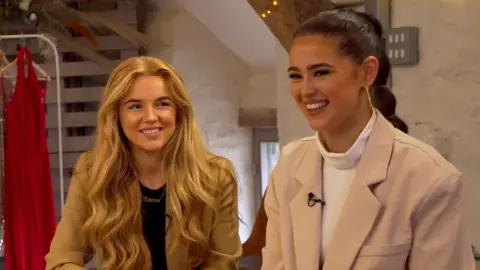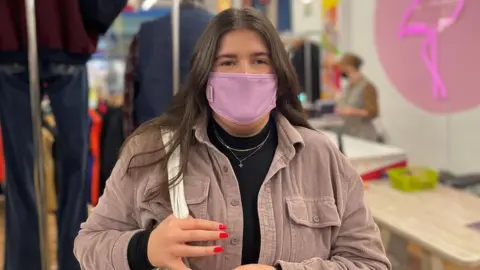Fast fashion: 'We all have to face up to clothes' climate impact'
Fashion is the third-largest manufacturing industry in the world and, by some calculations, it produces up to 10% of the world's emissions.
And fast fashion is a major contributor to greenhouse gases, water and air pollution, creating problematic levels of waste.
But with climate change coming into sharper focus, for many people the environmental credentials of clothes are fast becoming as important as their style and price.
The BBC spoke to a designer, a clothes-hire company and a consumer about what sustainable fashion means to them.
Starting a conversation with fish-skin bags

Moray Luke, of Porthcawl, Bridgend county, said she had always wanted to be a mermaid - so it's perhaps no surprise the 26-year-old designer chose fish leather to make some of her handbags.
The material has been hailed as a more environmentally-friendly alternative to most cow leather due to its durability, tanning process and use of waste material.
Moray's bags use skin left over from an organic Scottish salmon farm, and while she does not think they will change the world, she believes they will get people thinking.
"We say, from by-product to heirloom. If it wasn't for me it would end up in a bin, although it's sometimes used in vitamins," she said.
"It's a great conversation-starter to think about traceability. Because fish skin is such a striking material, people look at it and think, 'where do my handbags come from?'"
Fish leather currently accounts for less than 1% of total global leather sales, but the UN's Food and Agriculture Organization (FAO) is promoting its increasing production as a means to boost the incomes of fishing communities around the world.
"We don't have the luxury of being able to close our eyes to climate change, we're going to have to face these problems," Moray added.
'Wearing someone else's clothes isn't dirty'

Rhi Thomas and Tegan Turnbull, both 23, run a company which hires out clothes in south Wales, via Instagram.
The idea is, if someone wants an outfit for a night out or a special occasion, instead of buying it they borrow it from Hire the Attire.
Rhi said: "Years ago people had this perception of thrift shopping and wearing someone else's clothes, that it might be dirty or just not a nice thing to do. Whereas, actually, it's pretty fine and - why not?"
The pair said social media and wider environmental awareness meant more people now considered where their clothes came from.
Tegan said: "We're all guilty of it - 'I need something for this occasion', buying it and never wearing it again. Why we started [the company] was all about changing the mindset and sustainability."
Tegan said they tried to source items from their own wardrobes and friends to keep it "all within the same circle".
If they buy items for the business, they go for timeless, versatile garments.
Rhi added: "I definitely feel like there is a huge pressure on young people to look good and to not have a photo in the same thing more than once.
"I think it's just pushing it out there that it's OK to be wearing something more than once and making sure it's versatile and you can accessorise and make it look different every time. "

Fashion's impact, some facts and figures:
- Fashion contributes up to 10% of global carbon emissions
- It accounts for 20% of global wastewater
- Fashion uses more energy than aviation and shipping combined
- About 70 million barrels of oil a year are used to make polyester fibres
- A polyester shirt has double the carbon footprint compared to one made from cotton
- Polyester takes hundreds of years to decompose
Source: BBC/UN/various sources

'I'm willing to play my part'

Megan Rusbridge, 23, of Cardiff, is making an effort to cut down the environmental impact of her wardrobe.
She is buying second-hand items, more expensive, hard-wearing clothes that will last longer and choosing garments made from biodegradable materials, such as cotton.
She said: "I do truly believe it's for change to come from within the industry, but I'm willing to play my part in that way."
Megan said it would be a big step forward if more social media influencers were aware of the importance of "backing a more sustainable way of consumption".
She added: "Influencers can promote over-consumption and fast fashion. Information is out there if people want to consume in a more ethical way.
"It's a case of less is more. We don't need loads and loads of clothes. We need good-quality clothes that are going to last over time and, if we do decide to dispose of them, they can either be recycled or are biodegradable."

- HAYLEY PEARCE PODCAST : Tackling the issues that make your group chats go off
- COMING OUT: From secrets to social media, conversations from the LGBTQ+ community in Wales

